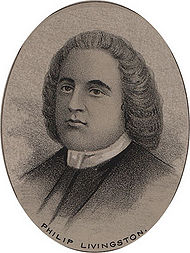Philip Livingston
| Founding Fathers | |
|---|---|

| |
| Philip Livingston | |
| State | New York |
| Religion | Christian- Presbyterian [1] |
| Founding Documents | Declaration of Independence |
Philip Livingston (b. January 15, 1716; d. June 12, 1778) was a patriot from New York and a Founding Father of America. He was a very successful businessman and served his community as an alderman. Philip was a delegate to Colonial Convention of Albany, a member of the Stamp Act Congress and he signed the Declaration of Independence as a New York delegate to the Continental Congress. Also, Philip Livingston became a New York state Senator and he helped to found King's College, now known as Columbia University.
Early Life
Philip Livingston was born into a wealthy family in Albany, New York. He graduated in the class of 1737 from Yale College and then married Christina Ten Broeck. Livingston quickly became a successful import merchant in New York City. [2] Livingston helped to found the New York Society Library, the St. Andrews Society, the City's Chamber of Commerce and King's College (now Columbia University). [3]
Politics
At age 40 he would step into politics as a member of the city's board of alderman. Livingston was reelected to the office for nine consecutive years. In 1759, he joined the provincial assembly and represented the colony at the Stamp Act Congress. Livingston stood-up for and wrote against British oppression. At the same time, he and his family worked to reconcile differences with Great Britain. in 1774, he assisted in preparing an address to the people of Great Britian. In the Continental Congress, Philip was joined by four of his relatives serving then; his brother William and cousins John Jay and Robert. Thye all wanted independence but only Philip had the convictions to sign the Declaration. The following year in May, Philip was reelected to the state Senate. In October 1777, he was reelected to Congress and took his seat in May 1778. At that time, the revolution reached Philadelphia when the British conquered the city. Congress was forced to hold sessions in York. Livingston's health started to deteriorate.
Death
Doctors gave Livingston no hope of recovery and he would say his final farewell to family in anticipation of death. At the age of sixty-two on June 12, 1778 Philip Livingston passed away. He is buried in York, Pennsylvania.